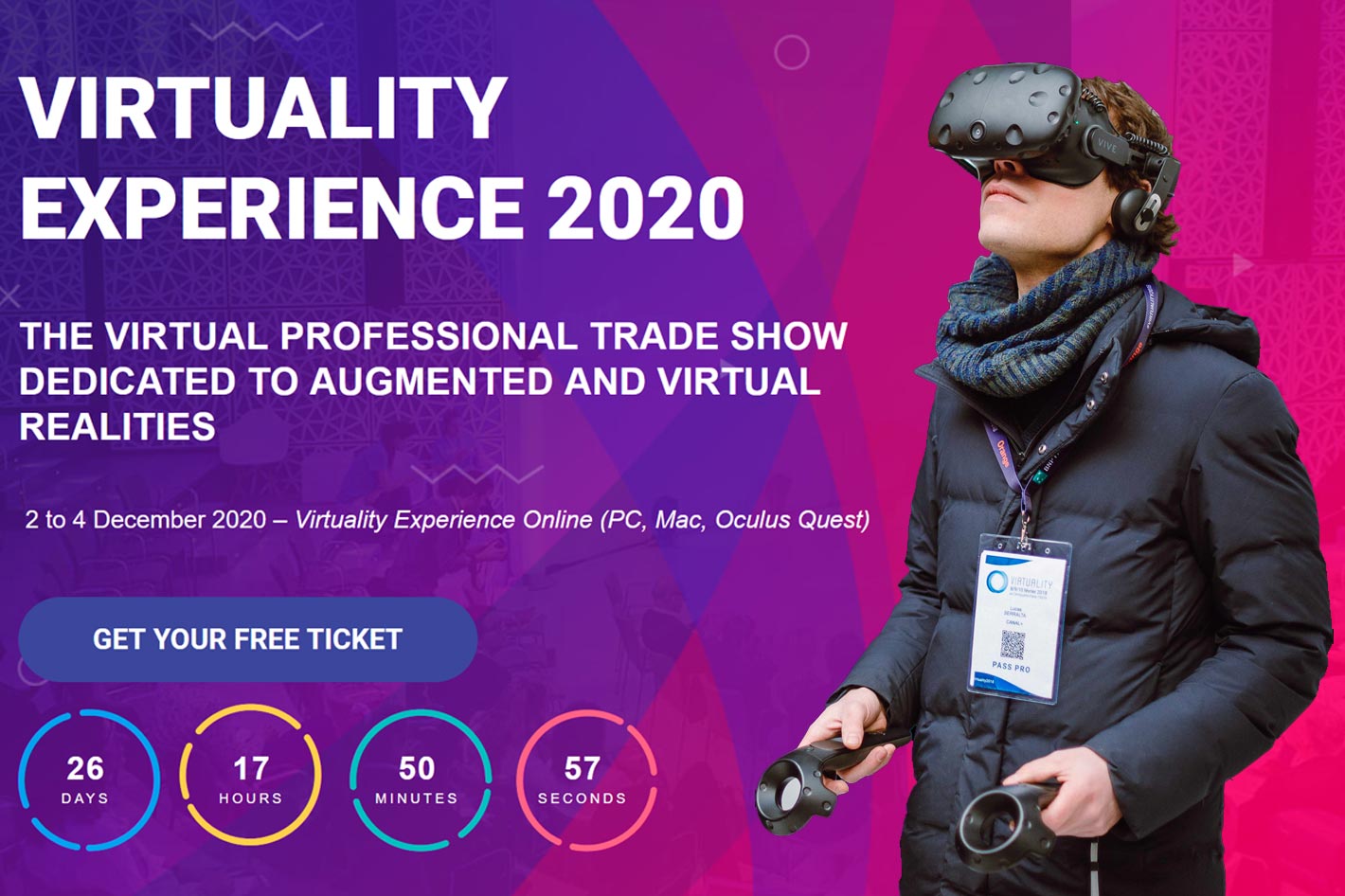
The Covid-19 pandemic has taken many by surprise and forced companies to move their events online during 2020. As the situation is not evolving in ways to suggest that 2021 will be much different, some of the coming events will be online, again. Some organizers have also decided that a complete online event has advantages and Virtuality, a professional showroom dedicated to virtual and augmented realities will move completely online for its next edition.
The organizers of the professional showroom decided to hold the fourth edition of Virtuality in partnership with the French digital platform Teemew, which, they say “is a visionary project for the world of events, with strong growth potential for all showrooms’ organisers.” Both companies believe this is a brand new format of virtual events and represents a tangible answer facing the consequences brought by the Covid-19 pandemic.
Teemew’s (Manzalab Group) and Virtuality’s teams developed a platform suited and dedicated to professionals from the world of events. The alliance between Teemew’s technical expertise and Virtuality’s knowledge of professional showrooms production has enabled the development of a unique solution on the market. It is, they claim, a genuine virtual business world that will be launched during Virtuality’s 4th edition (December 2nd, 3rd, and 4th, 2020).
Despite moving entirely online, Virtuality is, keeping its main goal: help boosting businesses. The showroom straightens its interaction with XR international ecosystem, while staying the primary venue where to learn and dialogue about the sector’s challenges. With the consequences of the sanitary crisis on this industry, it has become necessary to create new formats of events. The situation has compelled this sector to innovate and stay active, in order to survive.
“We have studied all digital solutions currently available for business showrooms’ organisers, – says Olivier Godest, CEO Virtuality – and we were not able to find any suitable solution for our needs and quality standards. We had to find a viable business model in order to offer an adapted experience to our clients’ professional needs. Teemew’s team perfectly understood our problematic and we immediately started producing Virtuality Experience. This solution will soon be deployed and adapted to many other professional events, if needed.”
During the announcement Clément Merville, CEO Manzalab, added this: “Our “Teemew solution” is the outcome of six years of R&D. Our work is based on virtual attendance and team work using virtual reality. Until now Teemew was used for training needs, or for taking important decisions remotely. Thanks to Virtuality’s impetus we developed a specific solution for showrooms, available to all on PC and Mac. We believe that virtual attendance is the answer to tomorrow’s world, a world where ecological issues will be essentials and physical movement will be of lower ranking.”
Microsoft, Lenovo and HP
From home, Virtuality’s visitors will be able to move inside a virtual universe and organize similar activities from the ones organized during the physical event: visiting booths and discussing with exhibitors, networking, exchanging virtual business cards or attending conferences. Only using a selfie, each participant will be able to create its own photorealistic avatar in just a few seconds. It will be possible for all participants to freely circulate in the showroom, send connections requests to other visitors, discuss by voice or text, exchange business cards, attend presentations, watch videos, etc. The showroom will be open to all international professionals 24 hours a day.
“Organising a professional virtual event offers many advantages. One of the most noticeable advantages is the development of the showroom’s international accessibility combined with carbon footprint reduction: visitors from everywhere in a more ecological showroom!” say the companies involved in this project, adding that “due to the reduction of polluting emissions engendered by avoiding many business trips, Virtuality will be able to welcome numerous international XR companies’ representatives. The intention is to convince lots of international professionals to visit this innovative events platform.”
35 companies have already made the move to acquire a virtual booth. Among them we find historical partners such as Microsoft or Orange, but also many players from the XR industry such as Minsar, Cap Gemini, Numix, Hérvé, Synergiz, Light & Shadow, Le Pavillon, Timescope or Lenovo.The virtual auditorium will host a rich program: keynotes speeches will happen every day from 10am to 7:30pm CET, as well as roundtables and pitches sessions.
Countries already represented in this edition of Virtuality: France, Belgium, Italy, Denmark, Sweden, Lithuania, United States, Argentina, Poland, UnitedKingdom, The Netherlands, Germany, India, China, Spain, South Africa, Tunisia, Chile, Brazil… Renowned international speakers have already confirmed their attendance: Joanna Popper (HP), Amy Peck, Robert Scoble, Andy Fidel, Dave Haynes (Vive X), Elizabeth Baron (Unity Technologies), Jason Lovell (PwC) and Lucas Rizzotto.
The Virtuality Experience Online takes place 2nd to 4th December 2020, entirely online. You can follow it using wither a PC or Mac. If you want to explore it in VR, you need to have a portable Oculus Quest, which is, IMHO, a limiting factor for an industry – Virtual Reality – that wants to reach huge audiences and offer them the best experience possible.
In fact, as VR experiences continue to grow more sophisticated and quite demanding in graphics terms, a VR headset tethered to a PC, like the Oculus Rift S or the upcoming HP Reverb G2, continues to be the best way to watch them. Also, platforms as Viveport, which are made compatible with a variety of headsets, appear to be a more logic choice for whoever wants to make Virtual Reality more accessible to the masses. Limiting the experience to a portable VR headset like the Quest, that is also tied to a mandatory Facebook account, does not seem to the best way to expand the reach of VR, I believe.
